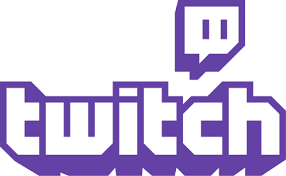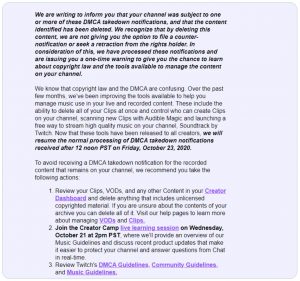 The Digital Millennium Copyright Act contains a safe harbor provision that says online companies can’t be held liable for hosting infringing content if they respond quickly to rights holders that ask them to remove the content in question, using the DMCA’s Notice and Takedown process.
The Digital Millennium Copyright Act contains a safe harbor provision that says online companies can’t be held liable for hosting infringing content if they respond quickly to rights holders that ask them to remove the content in question, using the DMCA’s Notice and Takedown process.

What happened, to prompt this?
One report holds that the Recording Industry Association of America (RIAA) posted a lot of claims to Twitch, which simply passed them on to the offending parties who use Twitch to distribute the content.
Twitch gave no chance to remedy the situation?
Several sources have reported that Twitch not only sent a mass of takedown notices to users suspected of distributing infringing content – including Twitch partners who are paid for contributions to Twitch – but also simply deleted their content.
This appears to have been in violation of another DMCA principle, that these users can pursue a counter claim with proof of what they are contesting. Nor, reportedly, did Twitch provide any tools to enable the users to select content to archive or delete on their own.
Read original reporting in Ars Technica
Read original reporting in The Verge
Why it matters
Automated detection technologies that use fingerprinting or watermarking, and platforms such as Audible Magic and YouTube’s Content ID can recognize content that may have been subjected to infringing use, such as incidental background music.
But what if the content was open source or the user may have had license to use the suspected material? While Twitch’s action seems heavy-handed; an over-reach that angered legitimate users – Twitch does post a DMCA notification and counter-notification process.
In any case, media service providers and owners can alienate their user base by being overly aggressive; which is one reason that some media companies are lenient even if they know of infringing activity.












